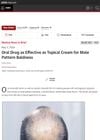
Oral minoxidil works as well as topical minoxidil for male pattern baldness.
 October 2023 in “Scientific Reports”
October 2023 in “Scientific Reports” Gene therapy helped rats with a specific type of rickets grow hair without severe inflammation.
 October 2023 in “Scientific Reports”
October 2023 in “Scientific Reports” Oxytocin may help hair grow by increasing hair growth-related genes and factors.
 May 2023 in “Frontiers in Cell and Developmental Biology”
May 2023 in “Frontiers in Cell and Developmental Biology” The document concludes that using stem cells to regenerate hair follicles could be a promising treatment for hair loss, but there are still challenges to overcome before it can be used clinically.
104 citations
,
January 2023 in “Journal of Clinical Medicine” A holistic approach is needed to effectively address hair loss by understanding and influencing the hair growth cycle.
 8 citations
,
October 2022 in “Regenerative Therapy”
8 citations
,
October 2022 in “Regenerative Therapy” New regenerative treatments for hair loss show promise but need more research for confirmation.
 13 citations
,
July 2022 in “Frontiers in cell and developmental biology”
13 citations
,
July 2022 in “Frontiers in cell and developmental biology” Tiny natural vesicles from cells might help treat hair loss.
 4 citations
,
July 2022 in “Annals of translational medicine”
4 citations
,
July 2022 in “Annals of translational medicine” Scientists created complete hair-like structures by growing mouse skin cells together in a special gel.
4 citations
,
March 2022 in “Pharmaceutics” Regenerative cellular therapies show promise for treating non-scarring hair loss but need more research.
 5 citations
,
November 2021 in “Plastic and Reconstructive Surgery”
5 citations
,
November 2021 in “Plastic and Reconstructive Surgery” Using special stem cells, we can create new hair follicles, potentially making hair restoration easier and more affordable.
 11 citations
,
October 2021 in “Carbohydrate Polymers”
11 citations
,
October 2021 in “Carbohydrate Polymers” Ginkgo biloba polysaccharides may reduce inflammation and promote hair growth in mice with hair loss.
 8 citations
,
May 2021 in “Bioengineering & translational medicine”
8 citations
,
May 2021 in “Bioengineering & translational medicine” Hair growth environment recreated with challenges; stem cells make successful skin organoids.
 42 citations
,
February 2021 in “Signal Transduction and Targeted Therapy”
42 citations
,
February 2021 in “Signal Transduction and Targeted Therapy” Hair follicle regeneration possible, more research needed.
1 citations
,
January 2021 in “Journal of Cutaneous and Aesthetic Surgery” Low-level light therapy can safely and effectively stimulate hair growth in people with androgenetic alopecia.
 39 citations
,
April 2020 in “Clinical, Cosmetic and Investigational Dermatology”
39 citations
,
April 2020 in “Clinical, Cosmetic and Investigational Dermatology” Asian hair is generally straight and thick, with unique disorders and properties, and more research is needed to understand it fully.
 22 citations
,
March 2020 in “Journal of The American Academy of Dermatology”
22 citations
,
March 2020 in “Journal of The American Academy of Dermatology” DSC cell injections significantly improved hair density and diameter, showing potential as a hair loss treatment.
 14 citations
,
June 2019 in “Dermatologic therapy”
14 citations
,
June 2019 in “Dermatologic therapy” PRP did not significantly regrow hair in alopecia areata totalis patients.
 113 citations
,
November 2017 in “Scientific Reports”
113 citations
,
November 2017 in “Scientific Reports” Tiny particles from stem cells help activate hair growth cells and encourage hair growth in mice without being toxic.
 133 citations
,
February 2017 in “PLoS Genetics”
133 citations
,
February 2017 in “PLoS Genetics” Genetic factors can help predict male pattern baldness risk.
18 citations
,
November 2016 in “PeerJ” Human hair follicles can be used to create stem cells that might help clone hair for treating hair loss or helping burn patients.
 214 citations
,
September 2015 in “Stem Cells Translational Medicine”
214 citations
,
September 2015 in “Stem Cells Translational Medicine” Platelet-rich plasma injections significantly improved hair regrowth and thickness in patients with hair loss.
15 citations
,
March 2014 in “Acta naturae” Researchers made stem cells from human hair follicle cells with higher efficiency than from skin cells.
8 citations
,
January 2014 in “PubMed” Researchers made stem cells from human hair follicle cells with better efficiency than from skin cells.
 300 citations
,
August 2012 in “Seminars in Cell & Developmental Biology”
300 citations
,
August 2012 in “Seminars in Cell & Developmental Biology” The conclusion is that certain cell interactions and signals are crucial for hair growth and regeneration.
 29 citations
,
January 2010 in “PubMed”
29 citations
,
January 2010 in “PubMed” FUE hair transplants offer minimal scarring and are good for short hairstyles but are time-consuming and can be costly.



















